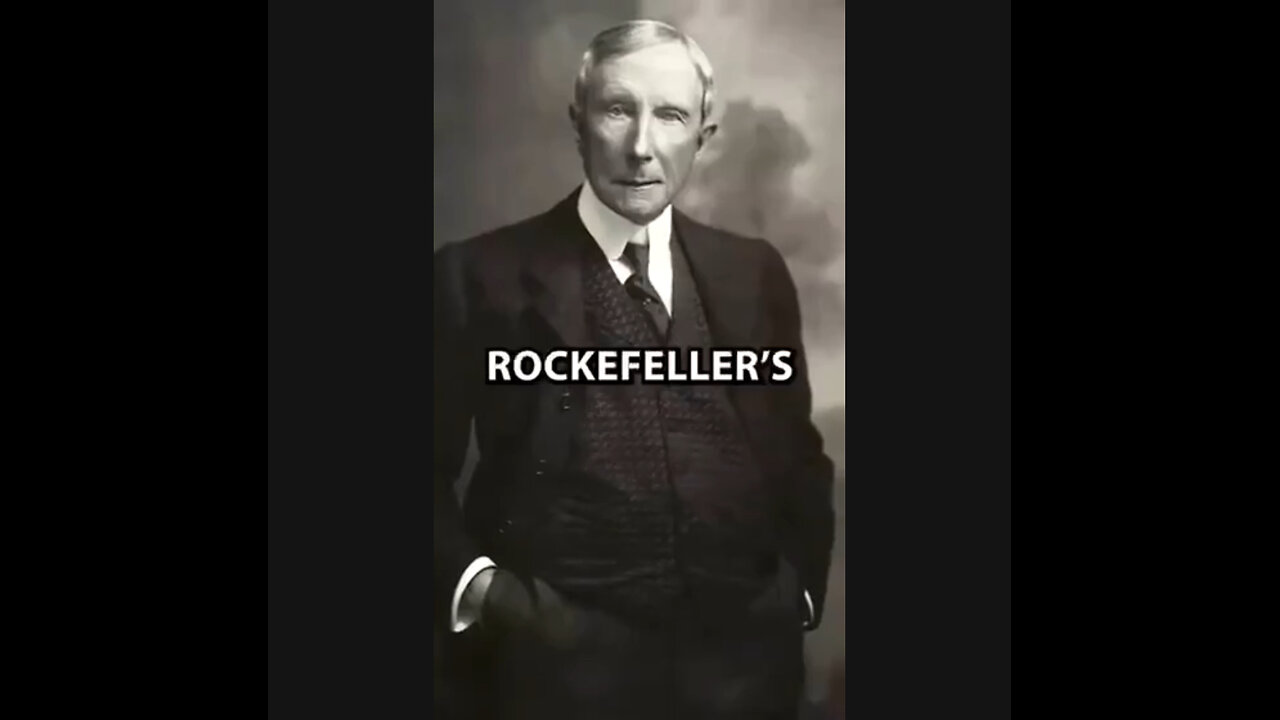Premium Only Content

The Fossil Fuel Deception: Unraveling the Origins of Oil and the Rockefeller Legacy
Imagine a world where the very foundation of our modern economy—the driving force behind global industries, transportation, and geopolitics—was built upon a deliberate lie. A carefully constructed narrative designed to ensure that a single family’s fortune, and ultimately their control over energy, would endure for generations. Welcome to the story of fossil fuels, a term that has shaped the global energy market for over a century, but whose origins may not be what you’ve been led to believe.
Let’s take a step back to the late 19th century, a time of immense technological transformation, where oil began to emerge as a resource far more valuable than its initial use as a mere lubricant for steam engines. It was during this pivotal moment that John D. Rockefeller, one of the most powerful industrialists in history, made his mark. But to secure his dominance over this burgeoning industry, Rockefeller needed to do more than just control the supply—he needed to control the narrative. And thus, the story of oil as a finite, organic resource was born. But was it true? Or was it simply a convenient fabrication, a strategic move to ensure continued scarcity and drive profits?
The Birth of the Fossil Fuel Myth
In the years before Rockefeller’s rise to prominence, oil was used primarily to lubricate machinery and, later, as a fuel source for lamps. As demand for oil grew, Rockefeller seized the opportunity to monopolize the industry, but he quickly realized that the perception of scarcity was essential to his long-term success. If oil were seen as abundant and easily replenished, the price would drop, and so would his profits. What better way to combat this than by convincing the world that oil was a limited resource—one derived from the remains of ancient, decayed organisms?
In 1892, Rockefeller made his move. By sending his scientists to the Geneva Convention, a global gathering of scientific minds, they presented the argument that oil was composed of hydrogen, carbon, and oxygen—the same elements found in organic matter. Thus, the term “fossil fuels” was coined, cementing the idea that oil was formed over millions of years from the remains of prehistoric plants and animals buried deep beneath the Earth’s surface.
But here’s the catch: no definitive proof was ever presented that oil came from fossils. The idea was persuasive, sure, but it wasn’t based on concrete evidence. Instead, it was a clever narrative woven together with just enough scientific jargon to pass as truth.
And yet, Rockefeller wasn’t done. He didn’t just manipulate the scientific community—he went after the very foundation of education itself.
The Rockefeller Influence: Rewriting Textbooks, Rewriting History
To solidify his control over the oil industry, Rockefeller took aim at the future generations who would be taught the “truth” about oil. He donated $180 million to the General Education Board, an unprecedented move that allowed him to directly influence the curriculum taught in schools across America. His investment ensured that every textbook published from that point forward would teach that oil was a finite resource, a fossil fuel that had formed over millions of years.
Think about that for a moment: the very foundation of what we’ve been taught about energy, economics, and the future of our planet’s resources may have been the result of a well-crafted manipulation. And once the concept of fossil fuels became ingrained in the public consciousness, it became a self-fulfilling prophecy. The fear of depletion, the urgency to discover new sources, the wars fought over oil-rich territories—all of these were shaped by the idea that oil is scarce.
Challenging the Fossil Fuel Narrative
So, where does this leave us? Let’s address the glaring inconsistencies in the fossil fuel narrative:
• Drilling Depths: Oil rigs have been able to drill as deep as 35,000 feet into the Earth. Yet, no fossils have ever been discovered below 16,000 feet. How can oil come from fossilized remains if the very depths from which we extract it contain no such fossils?
• Abiotic Oil Theory: Some scientists propose an alternative theory: that oil is not derived from organic matter at all, but rather from abiotic processes deep within the Earth’s mantle. This theory suggests that oil is a naturally occurring substance, formed through chemical reactions between carbon dioxide and hydrogen in the mantle, which is then pushed toward the surface through tectonic activity. If true, this would mean that oil is not finite, but instead a renewable resource—one that constantly replenishes itself over time.
• Rockefeller’s Lasting Influence: Beyond the scientific debate, it’s crucial to understand the economic incentives behind the fossil fuel narrative. By promoting the idea of scarcity, Rockefeller and his contemporaries ensured that oil prices would remain high, driven by the belief that we were always on the verge of running out. This fear of depletion created a monopoly—not just on the resource itself, but on the world’s understanding of it.
The Modern Implications: A World Built on Deception
Today, we find ourselves at a crossroads. The fossil fuel narrative has shaped our world in profound ways, from the environmental policies we enact to the wars we wage. But if the foundation of that narrative is false, what does it mean for the future of energy?
Consider this: if oil is not a fossil fuel, if it is not finite, then the entire premise of our energy crisis collapses. The rush for renewable energy, the fear of peak oil, the constant political tension over oil reserves—all of it rests on the assumption that oil is running out. But what if it’s not?
What if the true conspiracy lies not in the scarcity of oil, but in the manipulation of perception? What if the real goal has always been to keep humanity in a state of dependence—not on oil itself, but on the fear that we could run out of it?
Conclusion: Breaking the Illusion
It’s time to question everything we’ve been told. The story of oil is not just a tale of geology and economics—it’s a story of control, of power, and of the ability to shape the future through the manipulation of knowledge.
As we move forward, we must be willing to challenge the narratives that have been handed down to us. The truth is not always what we’re taught in textbooks, and the answers to our greatest questions may lie not in the fossils of the past, but in the courage to seek out new truths.
So, the next time you fill up your gas tank, ask yourself: Is this really the last drop of a dying resource? Or is it simply part of a much larger illusion—one that has kept us chasing scarcity, when abundance was there all along?
-
 18:38
18:38
DeVory Darkins
18 hours ago $6.94 earnedTrump Makes HUGE Announcement that may spark GOP Battle
19.7K31 -
 2:13:05
2:13:05
The Nerd Realm
3 hours ago $1.26 earnedNew Years Eve! Fortnite Hunters w/ YOU! Creator Code: NERDREALM
14.7K2 -
 LIVE
LIVE
FusedAegisTV
19 hours agoNYE Eve! - 2025 Incoming 🎉 - 12hr Variety Stream!
132 watching -
 1:18:52
1:18:52
Awaken With JP
6 hours agoSomehow The World DIDN’T End This Year! - LIES Ep 72
52.5K27 -
 1:19:34
1:19:34
Michael Franzese
4 hours agoWhat 2024 Taught Us About the Future?
60K16 -
 1:48:09
1:48:09
The Quartering
5 hours agoBird Flu PANIC, Sam Hyde DESTROYS Elon Musk & Patrick Bet David & Woke Witcher?
78.6K49 -
 4:47
4:47
SLS - Street League Skateboarding
3 days agoLiz Akama’s 2nd Place Finish at SLS Tokyo 2024 | Best Tricks
23.1K3 -
 DVR
DVR
LumpyPotatoX2
4 hours agoHappy New Year Rumble ! - #RumbleGaming
15.5K -
 10:37
10:37
One Bite Pizza Reviews
23 hours agoBest of Barstool Pizza Reviews 2024
45.7K29 -
 2:37
2:37
Tate Speech by Andrew Tate
6 hours ago2025 WILL BE YOUR YEAR
80.2K31